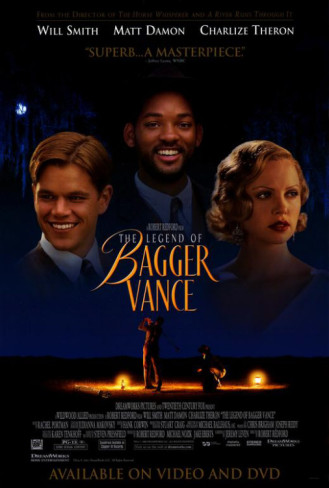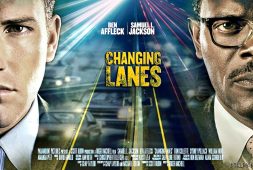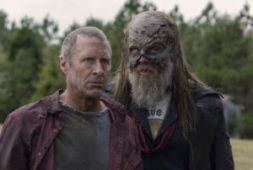 Main Point: It’s been said that “life is meaningless.” Sadly, that’s true…but only if our focus is on the wrong thing. If our focus is on God, then life is very, very meaningful!
Main Point: It’s been said that “life is meaningless.” Sadly, that’s true…but only if our focus is on the wrong thing. If our focus is on God, then life is very, very meaningful!
The Movie Clip:
Rannulph Junuh (played by Matt Damon) is a fantastic young golfer from Savannah, Georgia. He wins several amateur championships and garners the love and support of all of Georgia. Unfortunately, his career is sidetracked by World War 1, and though he survives, he experiences post-traumatic stress disorder after the war which completely destroys his game.
But when golfing greats Bobby Jones and Walter Hagen come to town to play in an exhibition match, Junuh is invited to play along with them to drum up local support. He declines the offer, but then meets a mysterious fellow named Bagger Vance (played by Will Smith).
Bagger convinces Junuh to play, and coaches the ex-soldier on how to re-discover his swing. Throughout the 2-day, 4-round tournament, Bagger gives Junuh advice on his golf game that also applies to his life. When it’s apparent that Junuh no longer needs Bagger’s help, he disappears as mysteriously as he appeared.
Introducing the Clip:
In The Legend of Bagger Vance, we’re told about Rannulph Junuh, a great young golfer who had a promising career as a player until World War 1 erupted in Europe. Though he came back from war alive, he came back heartbroken and traumatized because he’d seen all of his friends get killed. For years, he slouches around as the town drunk until the citizens ask him to represent them in a big golf tournament. He rejects their request, but eventually gives in to them, and squares off against Bobby Jones and Walter Hagen, two of the best golfers that ever lived. The clip I want to show you takes place after the first of four rounds in the match…with Junuh down 12 strokes. Take a look at what his caddy, Bagger Vance, has to say to him about his outlook on life.
Note: This film is available for rent and/or purchase; pick up a copy of this film and show the scene listed below.
Scene Script:
BEGIN CLIP AT 1 HOUR AND 3 MINTUES AND 39 SECONDS.
(The scene takes place in the locker room between rounds. Junuh is down 12 strokes, just about out of the competition, entirely. Bobby Jones, his opponent walks out and offers an encouraging word, leaving Junuh alone with Bagger Vance. Bagger begins telling a story to Junuh about his Uncle Rufus who lost his arms and teeth and almost his legs. Junuh gets upset at this “story about overcoming adversity” and then the focus of the conversation takes place.)
Junuh: I don’t care if I’m 12 strokes back! I just don’t!
Bagger: You don’t even wanna win?
Junuh: It’s just a game, Bagger.
Bagger: Ah ha! Yessir, you done said it yourself, now. It’s just a game. So, maybe, just maybe, there’s something else that’s riling you. Maybe you thought you were just gonna sashay out onto that green and the old hero of Savannah just reappear right by hisself. It don’t work that way, is all. The Junuh you was, you ain’t never gonna be again. Ever. And that’s all I’m saying.
Junuh: You don’t know a damn thing about me.
Bagger: Well, I know one thing for sure. You gonna look pretty foolish tromping out there with two different shoes on your feet.
Junuh: Ah, Jesus. You got an answer for everything don’t you, Bagger? Let me tell you something. There’s no difference between winning and losing and anything in between. What’s lost is lost. A man lives, a man dies. And in the end, it all turns out the same. You’re alone. And that’s all you ever gonna be.
Bagger: That a fact? Alone? So, a soul is born with everything that the Lord can give it, and things don’t go its way so it gives up, and the Lord just takes everything back – and….
Junuh: That’s right.
Bagger: And then the soul dies, alone? That pretty much what you said?
Junuh: That’s right.
Bagger: That’s a sad story, Mr. Junuh.
Junuh: Yes it is.
Bagger: And that’s just about the dumbest thing I heard any fool say. Ever. You got yourself a hard eye, there, Mr. Junuh. Soul is born with everything, then dies…. You a funny man, Mr. Junuh.
END CLIP AT 1 HOUR 6 MINUTES AND 47 SECONDS.
Transitional Statement:
It’s easy to see that the Great War had totally changed Junuh. He’d once been one of the greatest golfers in the country, but after his traumatic experiences, he was reduced to a shell of a man. His outlook was clear by his words: a person is born, a person lives alone, and then the person dies. End of story. In other words, Junuh believed that life was meaningless. Junuh isn’t the only one to say or believe that. In fact, somebody in the Bible even said it! But there’s one very, very important catch: life is only meaningless if we’re focused on the wrong thing. If we’re focused on God, then life is very, very meaningful! Let’s talk about that for a few moments.
Divide into Small Groups:
Let’s go ahead and split up into our discussion groups, and then afterward we’ll come back together for a final word.
CLICK HERE for a quick training article on how to maximize your small groups using our small group format—a great resource to equip your small group leaders.
Discussion Questions:
- AROUND THE CIRLCE: As we get started, let’s all take a second to share our names and why we DO or DON’T like the game of golf.
- ASK A FEW: How did Junuh describe golf…and life, in general?
- ASK A FEW: Why do you think Junuh had such a poor attitude about life and golf?
- ASK A FEW: In the clip, Bagger said, “The Junuh you was, you ain’t never gonna be again. Ever. That’s all I’m saying.” What did he mean by that?
- ASK A FEW: After Junuh ranted to Bagger about life being meaningless, how did Bagger respond?
- ASK A FEW: What about you? Do you think life is meaningless? Why or why not?
- ASK A FEW: How does King Solomon, the Teacher, describe life in verses 1 and 2?
- ASK A FEW: What is some evidence that King Solomon gives to support his theory that life is meaningless?
- ASK A FEW: We live in a very different world than King Solomon. When you and I look around, we see addiction, terrorism, hunger, evil, oppression, an often-flawed pursuit of happiness, brokenness, etc. What is your attitude about life as a result of these observations?
- ASK A FEW: By the way, do you find it ironic that King Solomon had this attitude even though he was KING? Why or why not?
- CONTEXT: You’ll need to say a few remarks about the following chapters in Ecclesiastes before you continue because we’re going to skip over to chapter 12. You’ll want to say something to the students along these lines:
For the next 11 chapters, King Solomon talks about all the good things in life (work, food, drink, friends, etc.) and how they cannot bring happiness, but he also talks about the bad things in life (like poverty, evil, injustice, etc.) that frustrate him even more. Here is just one example of each:Ecclesiastes 2:2-11
2 “Laughter,” I said, “is foolish. And what does pleasure accomplish?” 3 I tried cheering myself with wine, and embracing folly– my mind still guiding me with wisdom. I wanted to see what was worthwhile for men to do under heaven during the few days of their lives. 4 I undertook great projects: I built houses for myself and planted vineyards. 5 I made gardens and parks and planted all kinds of fruit trees in them. 6 I made reservoirs to water groves of flourishing trees. 7 I bought male and female slaves and had other slaves who were born in my house. I also owned more herds and flocks than anyone in Jerusalem before me. 8 I amassed silver and gold for myself, and the treasure of kings and provinces. I acquired men and women singers, and a harem as well– the delights of the heart of man. 9 I became greater by far than anyone in Jerusalem before me. In all this my wisdom stayed with me. 10 I denied myself nothing my eyes desired; I refused my heart no pleasure. My heart took delight in all my work, and this was the reward for all my labor. 11 Yet when I surveyed all that my hands had done and what I had toiled to achieve, everything was meaningless, a chasing after the wind; nothing was gained under the sun.Ecclesiastes 4:1-4
Again I looked and saw all the oppression that was taking place under the sun: I saw the tears of the oppressed– and they have no comforter; power was on the side of their oppressors– and they have no comforter. 2 And I declared that the dead, who had already died, are happier than the living, who are still alive. 3 But better than both is he who has not yet been, who has not seen the evil that is done under the sun. 4 And I saw that all labor and all achievement spring from man’s envy of his neighbor. This too is meaningless, a chasing after the wind.But as King Solomon closes his book – near the end of his life – his attitude changes and he remembers the God he once loved and served. He remembers what his life was supposed to be about – pleasing God, not himself – and he gives some great advice.
Read the following passage:
Ecclesiastes 12:1-7 (NIV)Remember your Creator in the days of your youth, before the days of trouble come and the years approach when you will say, “I find no pleasure in them”– 2 before the sun and the light and the moon and the stars grow dark, and the clouds return after the rain; 3 when the keepers of the house tremble, and the strong men stoop, when the grinders cease because they are few, and those looking through the windows grow dim; 4 when the doors to the street are closed and the sound of grinding fades; when men rise up at the sound of birds, but all their songs grow faint; 5 when men are afraid of heights and of dangers in the streets; when the almond tree blossoms and the grasshopper drags himself along and desire no longer is stirred. Then man goes to his eternal home and mourners go about the streets. 6 Remember him– before the silver cord is severed, or the golden bowl is broken; before the pitcher is shattered at the spring, or the wheel broken at the well, 7 and the dust returns to the ground it came from, and the spirit returns to God who gave it.
- ASK A FEW: Have you ever chased after something earthly – like King Solomon or Junuh did – only to be disappointed? If so, what was it?
- ASK A FEW: Why does Solomon say to remember God when we are young? Why is that important?
- ASK A FEW: It seems as though King Solomon’s attitude changes when he “remembers God.” Why is that? Why does a pursuit of God have such an impact on our life?
- ASK A FEW: Is your life purposeful and filled with meaning? If so, why? If not, why not?
- AROUND THE CIRLCE: What would have to change for your life to be filled with meaning?
Read the following passage:
Ecclesiastes 1:1-12 (NIV)
The words of the Teacher, son of David, king in Jerusalem: 2 “Meaningless! Meaningless!” says the Teacher. “Utterly meaningless! Everything is meaningless.” 3 What does man gain from all his labor at which he toils under the sun? 4 Generations come and generations go, but the earth remains forever. 5 The sun rises and the sun sets, and hurries back to where it rises. 6 The wind blows to the south and turns to the north; round and round it goes, ever returning on its course. 7 All streams flow into the sea, yet the sea is never full. To the place the streams come from, there they return again. 8 All things are wearisome, more than one can say. The eye never has enough of seeing, nor the ear its fill of hearing. 9 What has been will be again, what has been done will be done again; there is nothing new under the sun. 10 Is there anything of which one can say, “Look! This is something new”? It was here already, long ago; it was here before our time. 11 There is no remembrance of men of old, and even those who are yet to come will not be remembered by those who follow. 12 I, the Teacher, was king over Israel in Jerusalem.
Wrap Up:
In the clip we watched, we heard Junuh say that life was pretty much pointless and meaningless. He summed it by saying, we’re born, we live alone, and then we die. Pretty grim prognosis. His caddy, Bagger Vance, tells him that’s a stupid outlook on life. In fact, he says it’s the most foolish thing he’s ever heard.
Bagger Vance didn’t go on to give Junuh the truth, partly because Junuh stormed out of the locker room. But fortunately for you and me, we got a healthy dose of truth from King Solomon in the Book of Ecclesiastes. In his writings, Solomon starts off by saying that life is meaningless and everything about life is meaningless. He even gives illustration after illustration of his point of view: “Wicked people prevail, hard-working people suffer. Food and drink don’t satisfy. You’re gonna die one day anyway.” See, life is meaningless.
But then Solomon remembered the God of his youth, the God he once loved, the God who had given him his throne. He realized that his pursuits of all those other things had led him nowhere. Meaning could not be found in food, wine, friends, work, money, sex, long life, or anything else on the planet. Meaning could only be found in God.
That’s the simple, but profound, message in the Book of Ecclesiastes. I want that to land on your heart before you leave. If your life has true meaning, it’s because you serve God with it. If your life doesn’t have meaning, it’s because you don’t serve God with it.
So take a long hard look at your life for a moment. Are you filled with purpose? Do you have a reason to wake up each morning? Do you know Who defines you? Are you filled with joy – not happiness, but joy – because of what God is doing through your life? If you answered no to any of those questions, we need to talk before you leave. I’d invite you to speak with myself or one of our adult leaders before you leave.
Don’t let your life go one for another meaningless day.
Close in Prayer
Written by David R Smith
Jonathan McKee
Jonathan McKee is the author of over twenty books including the brand new The Guy's Guide to FOUR BATTLES Every Young Man Must Face; The Teen’s Guide to Social Media & Mobile Devices; If I Had a Parenting Do Over; and the Amazon Best Seller - The Guy's Guide to God, Girls and the Phone in Your Pocket. He speaks to parents and leaders worldwide, all while providing free resources for youth workers on TheSource4YM.com. Jonathan, his wife Lori, and their three kids live in California.



